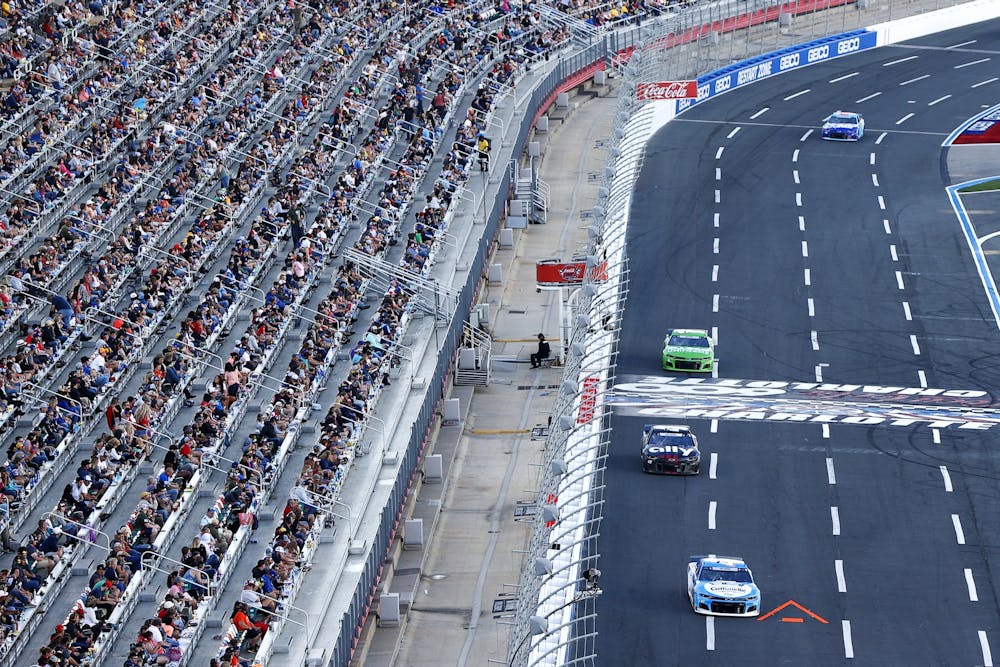Grayson Joslin is a sophomore journalism and political science major and writes for The Daily News. His views do not necessarily reflect those of the newspaper.
And then there were fourteen.
With Christopher Bell’s win at New Hampshire Motor Speedway July 17, the Cup Series added another winner to the sixteen-driver playoffs. Under NASCAR rules, any driver that wins and is in the top 30 in points is eligible for the season-end playoffs. This means that with six races to go until the playoffs begin, there are only two spots left available.
For the first time since the “win and you’re in” format of the playoffs was introduced in 2014, there is a serious chance that there will be more winners than spots in the playoffs. It’s an extraordinary situation, helped out by the equalizer for the field; the Next Gen chassis.
Originally set to be introduced in 2022 but pushed back a year due to the pandemic, the Next Gen chassis marked a major departure from how a NASCAR race car was previously constructed. The days of building the majority of each car from scratch are now gone, as most aspects of the car are now uniform.
The many changes to the car, including a fully symmetrical car design, allowed driver control to be put back to the forefront of the card after many years of mediocre racing due to NASCAR toying around with regulations that didn’t need to be changed.
With over half of the season finished, the Next Gen car has succeeded in its goal for closer racing and more parity. Many phenomenal races have taken place, quieting doubts from many fans (including myself) about the car.
The on-track action has gotten better this season, and it's the drivers finally making moves for the win, not the package preventing those moves. The statistics show how competitive this season has been.
With 20 of the 36 races finished, there have already been 33 drivers who have scored a top-ten, with 26 of those drivers also having a top-five finish. For comparison, over the entirety of last season, there were 36 drivers who had a top-ten finish.
This means more drivers are getting to run up front and fight with the best of the best.
This season has seen many mid-field teams and drivers competing for top five’s and wins. From Erik Jones at Fontana and Talladega to Ricky Stenhouse Jr. at Dover and Corey LaJoie at Atlanta, teams that are usually in the back half of the field have had their days in the sun this season.
This has me excited.
Seeing drivers and organizations who usually don’t spend time up front fighting for the chance at a win shows this car has done a great job of bringing the "little guys" closer to the "big dogs". The diverse spread of winners, from rookie Austin Cindric to 2004 Cup Series Champion Kurt Busch, and the fact that only five drivers have won more than one race, leads me to believe that this season could break a record that has stood for more than twenty years.
The 2001 season had 19 different winners in 36 races, including 5 first-time winners. 2022 has had 5 first-time winners already. If more winners come into victory lane, it could lead to this season tying the record for parity, when it comes to the number of winners.
This season has also produced so many good stories.
Daniel Suarez became the first Mexican winner in the top series in NASCAR, Tyler Reddick finally broke through to win at Road America and Denny Hamlin won the longest race in NASCAR history (distance-wise). However, the implosion of winners could lead to a major problem when it comes to the playoffs.
Ever since it was implemented in 2004, the NASCAR playoffs have drawn ire and scrutiny from many fans of the sport. After Kevin Harvick, who had nine wins and a mind-boggling average finish of 7.3, failed to advance to the championship round in 2020, many fans felt the system was based on luck and entertainment, not fairness.
Usually, the derision was due to the ending of the season, not about who made it into the playoffs. This could change with this season.
Currently, Ryan Blaney sits in 2nd place in the regular season standings, but with no wins to his name, he is currently one of only two drivers in the playoff based on points. If two more different drivers win, then Blaney, who has the third best average finish out of all drivers this year, loses his chance to compete for a championship.
The new competitiveness of the Next Gen car could lead to the undoing of the already unfair playoff system.
During NASCAR’s boom period in the 1990s, many people were sold to the product by the fact that anyone could win on any given Sunday. The abundance of great drivers and many quality teams fighting to make the 43-car field, led to underdogs such as Joe Nemechek, John Andretti and Ricky Craven scoring popular wins.
With the success of the Next Gen car so far and the goal to bring more teams and manufacturers into the sport, it could mean once again, anyone can win on any given Sunday.
Contact Grayson Joslin with comments at Grayson.joslin@bsu.edu or on Twitter @GraysonMJoslin.





The Daily News welcomes thoughtful discussion on all of our stories, but please keep comments civil and on-topic. Read our full guidelines here.